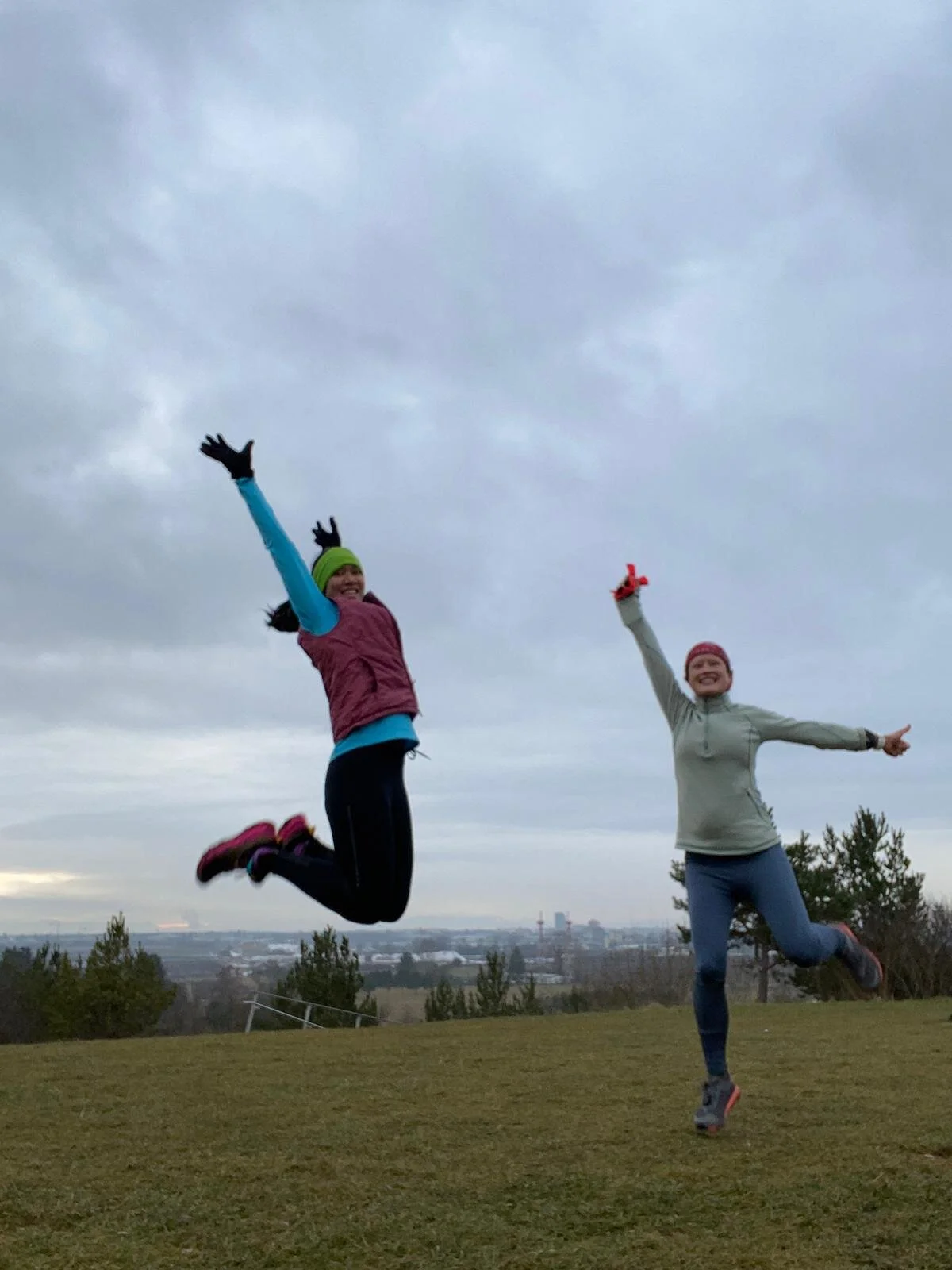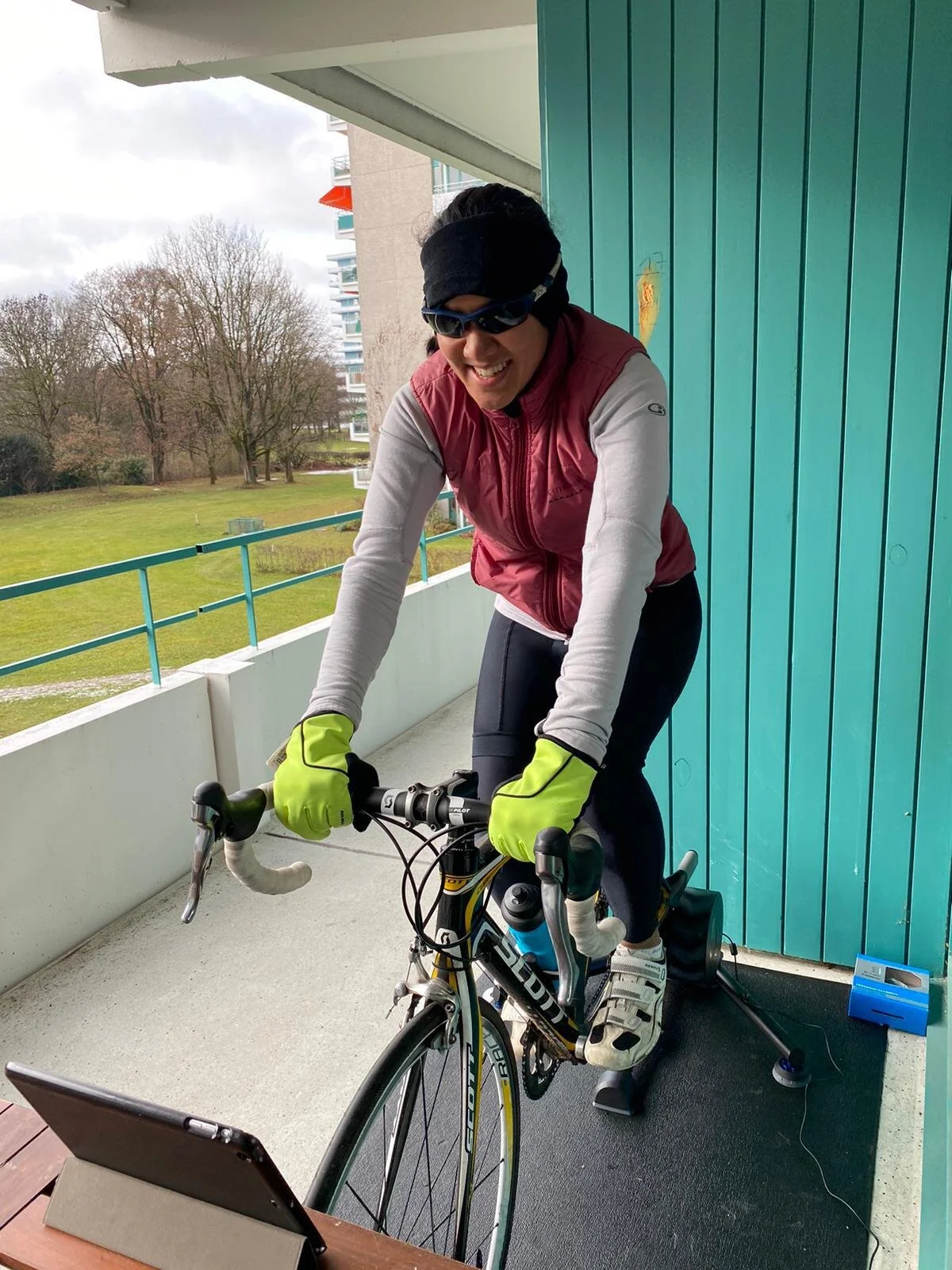A Just Ask Tante Pia column
By Pia Johansson and Jordan Sapir
Calling all novice and professional runners
Last month, Tante Pia received fan mail asking the burning question of this season: How do I stay warm during cold weather running? In the second part of her answer, Tante Pia teams up with Über Moms President, Jordan Sapir, to get all you mom runners prepared for the running season ahead.
Does the cold make you run slower?
Tante Pia: Yes and no. It does if you are actually cold, that is if your core temperature is dropping. But most of the time we are not cold during winter running, so the cold doesn't really affect your pace. But the extra layers and the change in road and weather conditions might. That’s why winter is good for base-training.
Jordan: Winter is the perfect time to start running. We hope that with our tips, you’ll embrace winter running, stay safe, motivated, and most importantly, have fun!
Leggings
Pia: I get very cold hips, thighs, and hip-flexors, so my recent discovery, the “winter running skirt” is a game-changer. It is quite thick, creates an extra layer of air, and is not in the way of your legs. It gets really warm, so I definitely don’t use two layers under that. This is also great for people who suffer from cold butt syndrome (official scientific term). This is not official running gear; I found it in the outdoor part of the sports store (for example this one from Craft). Mine is a store brand from Sweden and I love it.
Jordan: I’m all legs and need a lot of coverage. I love leggings that are a bit thicker or have special heat insulation technology.
Gloves
Jordan: My hands are the first part of my body to become cold. If I don’t have gloves on at the start of my run, by the end my hands are frostbitten. Severe frostbite is extremely dangerous, not to mention unnecessarily painful. You’ll want to protect your hands from the elements with gloves. I prefer gloves that are reflective, windproof, and waterproof, with a touch screen function. If I’m doing intervals and need to use my phone as a timer. I’ve purchased two pairs of running gloves in total and still have both.
They no longer make the pair I purchased, but these have a similar description. The second pair I recently purchased at Tchibo. They even have an extended mitten feature and a place to put your house key.
Pia: I have very cold hands. I always wear gloves in winter. Running gloves or normal finger gloves from H&M. I often take them off after a while, but if I didn’t start with them I would get frostbite for sure.
Shoes
Jordan: Speaking of dry, there's nothing more uncomfortable and dangerous than wet feet. Let’s discuss socks, frostbite (avoid it at all costs), and shoes. Before going out for a run, check the temperature and the wind chill. Both can factor into making smart clothing choices.
Shoes are difficult, not only in the winter. For newbies (and all runners), the most important factor in running is shoe fit. I have incredibly problematic feet. I have special orthopedics that I use to run. In Germany, you can get a prescription, and a trip to the orthopedist is covered by insurance. You might want to find a shoe that is comfortable and made for the terrain you’re mostly planning to run on. If you have pain in your feet, legs, shins, or hips, chances are it’s your shoes.
Please don’t go out and start your running program in old beaten-up shoes with worn-out soles. You can, but since we know you’ll love running, invest in a pair of comfortable and well-fitting shoes.
Running shoes in the winter will have some type of mesh layer for warmth, water resistance to keep your feet dry, reflectors, and possibly good treading, depending on the brand. You don’t have to go out and buy a new pair of winter shoes, but now is not the time to start your barefoot running trial.
Pia: You can wear normal shoes if they have good traction or if the ground is bare, special winter shoes or your normal shoes with spike add-ons like YakTrax when it is icy. But be careful with ice! Ice is when I don’t run. Slush, snow is ok, but ice I try to avoid.
Über Mom Money and Time Saving Hack
Jordan: I put plastic bags on my feet before putting my shoes on. Dry feet make a happy runner. Make sure to put them over your socks to prevent chafing and blisters.
There are great trail-running shoes on the market that could compensate for slippery roads and give significant traction. The bonus is that after the snow melts and you change to lighter shoes, you might shave a bit of time off your PB. This is a great alternative for newbies, who want to test running this winter while saving money.
Snow spikes and chains
Jordan: By attaching a rubber add-on to your running shoes with tiny chains for traction, you can make running in the snow safe and fun. Spikes and chains are available for under 100€. Our favorites are Yak Trax and Micro Spikes
Socks
Pia: Wool!! They keep you warm. Especially if your feet get wet. Essential.
Jordan: I couldn't agree more. I stay away from cotton running socks. I even wear wool ski socks sometimes when it’s really freezing. My favorite socks are Balega and my signature Jordan socks.
Accessories
Lights and Reflectors
Pia: These are to keep you visible (vital!) and to see where you’re going. Headlights and other lights do both. Reflectors are great, but if the thing you’re about to run into doesn’t have a light of some sort, they won’t see you (which might be both dangerous and scary for both of you). I always wear reflectors when it’s dark, and sometimes my headlamp as well. But I don’t like to run where I really need my headlamp, so I don't use it, but keep to the lit areas.
Sunglasses
Pia: if you run in the snow, the sun reflects the sun rays into your face, so sun protection is important (for both face and eyes). Wear sunglasses that are made out of only plastic so you don’t get cold burns from random metallic parts. Sunglasses can also help against the wind.
Hydration
Jordan: Many runners have started wearing hydration vests because they’re convenient and easily accessible. Hydration is incredibly individual, and speed and endurance dependent. New runners might think they don’t need as much water during the winter, but that isn’t necessarily true. I like to keep a few things in mind on my long runs. The first is that I have an incredible fear of being attacked by an animal (bears come to mind—there are at least three in Europe!). The second is getting lost. If I plan a long run in the winter, I should be hydrated enough to leave the water at home. For me, hydration starts eight hours before my run. What I’m more afraid of is getting lost. A wrong turn here, a wrong turn there, no food or water, and freezing temperatures do not make a responsible runner.
A great way to avoid the (highly exaggerated, yet feasible) story is to carry a hydration backpack, vest, or belt.
What to look for
Lightweight
Most bags, vests, or belts for running are designed with lightweight materials. Running with backpacks or fanny packs not intended for running can be uncomfortable and you could develop injuries.
Durability
You won’t believe how sticky fueling gels can destroy materials. Backpacks can also become smelly after a few runs, so you’ll want to be able to wash them at high temperatures.
Harness Straps
There are a lot of harness strap possibilities. I hope I can help you save money by telling you that the only straps that have ever worked for me have been a double harness strap that attaches above the breast and around the waist. Brands vary tremendously on closures, but I prefer a clip-on attachment.
A lot of bags and backpacks have water bladders. I prefer vests or backpacks that have bottle holders. I find bladders difficult to clean. As a mom, I am always cramming a run in between pickups, drop-offs, and appointments. It’s not always possible to clean the bladder immediately after.
If you do opt for a bag with a water bladder, an Über Mom Runner once gave me the tip to clean it using the effervescent tablets that are used to clean water bottles. There are quite a few options available.
Of course, there are a lot of choices on the market. You’ll have to test out what works for you.
I have a few favorites to recommend.
I love the Salomon Agile for long runs and a Flipbelt for middle-distance runs.
Salomon has a great introduction to hydration bags here.
Pia: So my main tips are: warm-up inside, layers with air in between, wool socks, visibility, and be prepared to take things on and off during your run! Oh, and don’t stop (you’ll cool down fast), and get changed quickly when you get home.
Final tip
Jordan: If you’re new to running or an avid runner, wear a tracking device or have a friend or partner track you. It’s dark earlier, easier to lose your sense of direction, and weather conditions could cause complications. You can share your location via Whatsapp, buy an add-on for your watch called an id-tracker, or use your “Find my iPhone” function. It allows remote location tracking. If you were to get into trouble, or lost, the person tracking you would be able to find your exact location.
Garmin has a function that automatically calls the police if a high impact is detected.
Don’t wear earbuds at night. Bring money in case of an injury or food emergency. Stay along well-lit paths if possible. Wear bright visible clothing and a head or body lamp at night. If you see a bear (most likely you won’t) don’t run, walk.
Über Moms Runners meet the last Sunday of every month except during lockdown. During the lockdown, we meet online to discuss everything running and participate in monthly challenges.
In the spring, or whenever restrictions are lifted, we’ll continue our meetups, team races, and team practices. We look forward to seeing you pushing the pavement.
Pia Johansson
Pia Johansson is a research scientist in neurobiology, mother of two and working mum. She was an expat for almost twenty years, in Australia and Munich and a short wild stint in Dublin many many years ago. She is in the throes of being repatriated to Sweden with her Australian husband. She likes talking, running and talking about running. And chocolate (although mostly 85% these days, as crazy as that sounds). In addition to staying fit and eating healthy, and raising happy healthy children, she dreams of doing something a little bit creative like writing or becoming a photographer. Or at least organizing her photos soon.
Jordan Sapir
Jordan Sapir, mother of two glitter-laden girls, 4 and 6, studied Journalism and International Political Science in NYC, a place she once called home. She can slaughter five languages fluently. She has worked in a newsroom or two, walked a catwalk or three, and is all for an impromptu adventure. Having traded in her Prada for pretzels, the founder of Über Moms lives in Munich, where she is a stay at home mom and studying to become a certified nutritionist. She is a mommy on a mission and wants to help fellow mothers raise healthy happy families, and beat a PR here and there.







